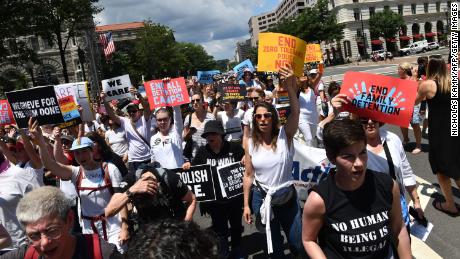But there are still roughly 1,900 who need to be reunified or ruled ineligible by next Thursday, and a government attorney warned "some complicated issues" will pop up in the coming week. Still, at a court hearing Friday afternoon, the judge who last month ordered the government to put back together the families it had separated at the border said he was very pleased with how things are going."I am just very impressed with the effort that is being made," US District Judge Dana Sabraw told the attorneys in the case. "It really does appear that there's been great progress and that — at least for those class members who are eligible and easy, relatively speaking, to reunify, and that's a very significant number of the group — that that is happening, and it's very promising."After the Trump administration's widely criticized "zero-tolerance" immigration policy that resulted in thousands of family separations at the border, Sabraw ordered the government to reunite families it had separated, including those from before that official policy.Some of the parents and children have spent months apart, shuffled to facilities all over the country. Communication has been difficult for many, with some parents of even young speaking to their kids only a handful of times at best. But the pace of reunions has ramped up substantially this week, as officials scramble to meet the judge's deadline. Justice Department attorney August Flentje told the judge that even since an update filed Thursday evening, another almost 100 children had been reunited with their parents. As of 7 a.m. ET Friday, there had been 450 reunifications. That was in addition to the at least 58 children under 5 who were reunited in the first stage of the court's order. But there are 2,551 children 5 and older in government custody likely to have been separated from their parents at the border who must be reunified by next Thursday's deadline, if they are found eligible.According to the latest government numbers, that leaves almost 1,900 who are still awaiting reunion or eligibility determinations. Close to 250 parents have already been ruled out — most because they declined reunification and the rest because of criminal records or other concerns.  The pace of reunifications could continue to be rapid. In court Friday, Flentje said nearly 1,000 parents had been already cleared to be reunited. But hundreds of the remaining parents could have already been deported, as well. The government has yet to provide a figure for how many were sent back to their home countries without their children. On Tuesday, Sen. Dick Durbin, an Illinois Democrat, said administration officials told him it was at least 180. There are still 37 kids whose parents are unknown entirely."There's a lot of work left to do," Flentje said, adding that the Health and Human Services Department official leading the effort "is working hard to get this done.""I think there are going to be some complicated issues that arise in this next week, especially in some of these areas that are harder to track down the parents," he added.
The pace of reunifications could continue to be rapid. In court Friday, Flentje said nearly 1,000 parents had been already cleared to be reunited. But hundreds of the remaining parents could have already been deported, as well. The government has yet to provide a figure for how many were sent back to their home countries without their children. On Tuesday, Sen. Dick Durbin, an Illinois Democrat, said administration officials told him it was at least 180. There are still 37 kids whose parents are unknown entirely."There's a lot of work left to do," Flentje said, adding that the Health and Human Services Department official leading the effort "is working hard to get this done.""I think there are going to be some complicated issues that arise in this next week, especially in some of these areas that are harder to track down the parents," he added.
Original Article
[contf] [contfnew] 
CNN
[contfnewc] [contfnewc]






